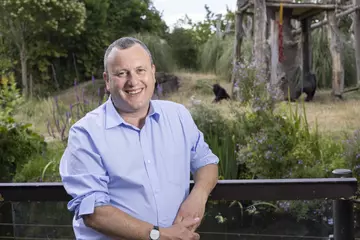
Matthew Gould
ZSL Chief Executive Officer
Tackling deforestation through business
It’s not often that a global problem comes along that the financial sector can actually fix, and quickly. But the wholesale destruction of the world’s forests is exactly that.
Every single week an area of tropical rainforest the size of London vanishes. An annual loss of 10m hectares – equivalent to the size of England.
Why forests matter to business
This should matter to every company, fund and investor. Deforestation is a climate catastrophe, contributing 30% to global emissions. If deforestation were a country, it would be the third highest emitter in the world. We simply cannot achieve net zero targets without tackling deforestation. If a company is serious about its climate goals, then it needs to be serious about deforestation.
The economic stakes are high too. According to a BCG analysis, the total value of the world’s forests is between $50 trillion to $150 trillion. They support essential systems for the functioning of the planet - clean water, clear air, natural cooling, food security. All disrupted and destroyed by deforestation.
There are other costs to destroying forests – we know that nature’s secrets still hold great promise for human endeavour, from medicine to engineering. We know that destroying forests is a key driver of biodiversity loss, and the decimation of wildlife populations. Forests are worth far more than their dollar value; they make our planet habitable.
Yet despite us knowing the value of forests, collectively we have failed to reflect this in our economic systems. Destroying forest to plant cash crops shows up as an increase to GDP. No one has to pay for the destruction of natural capital. We see year after year the tragedy of the commons play out in bulldozed and burnt forests across the world.

Deforestation regulation
The regulators and markets are starting to catch up. More and more consumers are differentiating between products on the basis of their environmental impact. For young people, being green is an increasingly important factor in choosing between employers. More investors do not want their capital to be powering deforestation.
And regulation is coming. The EU is requiring companies do a higher level of due diligence on their impact on forests. The UK is gearing up to do the same. And attention is starting to turn from manufacture and retail to finance. The UN has set a 2025 target for deforestation-free finance.

What makes this exciting is that we know we can do something about it. More than 90% of deforestation is fuelled by a handful of commodities – beef, soy, palm oil and timber - which means the drivers are susceptible to market incentives. When countries, regulators or markets decide to change the economic calculation, the changes can be dramatic. Deforestation in the Amazon has halved. Indonesia's forest loss has been shrinking fast.
The finance sector is uniquely placed to drive this change. Investors can use their capital to change the calculations of the companies currently powering the destruction of forests. And those companies – identified as the highest risk for deforestation - are currently receiving huge amounts of investment.

Helping business tackle deforestation
We can help investors that want to de-risk their portfolios. A trio of conservation organisations – Global Canopy, the Stockholm Environment Institute, and the Zoological Society of London, which I lead – have together created Forest IQ, a data platform that provides open data and metrics on how thousands of companies are addressing their exposure to deforestation.
Designed in consultation with some of the world’s largest and most exposed banks and asset management firms such as Blackrock, BNP Paribas and HSBC, Forest IQ unlocks standardised data at scale, making it much easier to transition away from deforestation.
The finance sector already holds the power. Forest IQ provides the data and tools to screen portfolios, engage with high-risk companies, and steer them towards greener (more forested) pastures.
